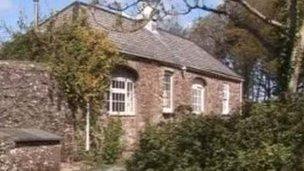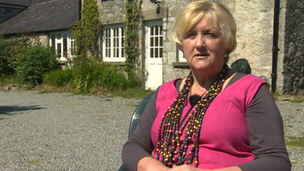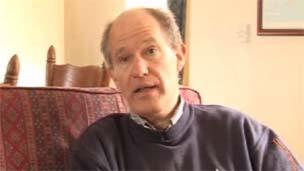Tourism warning over self-catering holiday home tax
- Published

Some holiday home owners are feeling the effects of the bad weather
Tourism businesses have warned the closing of a council tax loophole could also threaten owners of self-catering cottages and flats, already hit by the weather and the economic climate.
Those unable to find self-catering guests for more than 70 days during a financial year face paying more.
Some will now have to to pay council tax on holiday properties instead of less expensive business rates.
One tourist trade association said the extra expense could close businesses.
The regulation is intended to stop owners of second homes paying less council tax by listing their properties as holiday lets while not actively looking to rent them out.
But tourism businesses say the effect of bad weather and the poor economic climate, combined with the prospect of council tax bills, is putting a strain on the self-catering industry in Wales.
A recent survey by the Wales Association of Self-Catering Operators (Wasco) identified that 42% of those who responded said that business over Easter this year was worse than last year.

Felicity Elphick said the tax situation had proved to be a 'nightmare'
Almost three quarters (73%) of those who responded said that economy was a factor and 71% blamed the performance of the economy on the poor performance.
Only 10% of those who responded reported an increase in business.
Felicity Elphick, who owns Lleiniog Holiday Cottages near Beaumaris on Anglesey, has recently been told that she has to pay council tax on her two grade II listed properties next year.
"It's been a nightmare to put it mildly," she said.
"One of my properties - not this last tax year but the tax year before - failed the 70 days by six days.
"I lost my business rates which is actually now costing me £1,000 per year as opposed to no business rates whatsoever."
'Significant change'
Jan Meulendijk and his wife Jacqui own and run Rosemoor Holiday Cottages near Dale in Pembrokeshire.
They live on site and have nine cottages and flats available for rent.
Their properties have been occupied for more than the 70 day letting requirement in recent years but business is down on previous years and the couple are concerned that they could be affected in the future.
Mr Meulendijk thinks that politicians can take action to help those running self catering businesses.
"For us our properties are business properties," he said.
"Business assets used as business assets and nothing else and that distinction should be made and can be made and that is something that i think that politicians should have a good look at."
Mr and Mrs Meulendijk say that they would struggle to find the thousands of pounds that they would have to pay if their bookings dropped below 70 nights a year and they were forced to pay council tax rather than business rates.

Jan Meulendijk thinks that politicians can take action to help the businesses
That story is not an uncommon one according to Maudie Hughes, the chief executive of Pembrokeshire Tourism, which is a trade association representing tourism operators in the county.
"For some businesses it could potentially be the final straw that breaks the camel's back," she said.
"Small businesses that qualify for rate relief take advantage of that... So some businesses are not paying any rates at all so to go from that to then being asked to pay full domestic rates could be quite a significant change.
"You could be looking at perhaps maybe £1,000, £1,500 or £2,000 a year at present that they are not having to pay.
"When you're running a business with very tight margins already that's the one thing that will just push it over the edge."
The Welsh government will publish a national tourism strategy in early June.
In a statement, a spokesman said Local Government Minister Lesley Griffiths and Economy Minister Edwina Hart have commissioned independent research to examine the operation of the regulations.
He said they were "originally introduced to close a loophole allowing some home-owners to pay lower council tax by listing their property as a holiday let whilst not actively seeking to let it".
You can see more on this story on the Sunday Politics Wales on BBC1 Wales at 11:00 BST on Sunday.
- Published21 May 2013
- Published6 May 2013
- Published4 May 2013
- Published6 April 2013
- Published28 February 2013
- Published16 January 2013